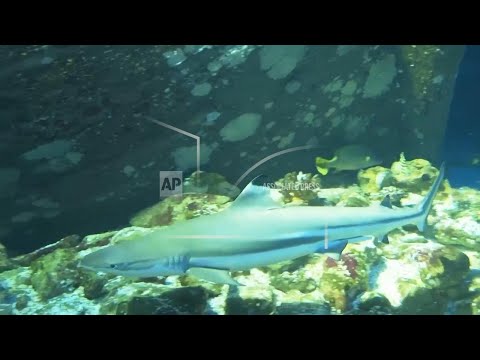(29 Aug 2025)
ASSOCIATED PRESS
Oberhausen, Germany – 29 August 2025
1. Various of sharks in tank at Sea Life Oberhausen
2. Set up shots Maximilian Baum, the study’s lead author and a researcher working with the Heinrich Heine University’s Institute for Zoology and Organismic Interactions, and Prof Sebastian Fraune, head of the Zoology and Organismic Interactions Institute at Heinrich Heine University in Duesseldorf, in aquarium tunnel looking at shark teeth
3. SOUNDBITE (English) Maximilian Baum, lead author of study:
"We discovered that oceanic acidification can damage shark teeth and we’ve known for many, many years that it corrodes also the shells of mussels and also coral skeletons, but we discovered that also shark teeth are affected."
4. Close of shark jaw
5. Mid of Baum placing shark teeth next to shark jaw
6. Close of shark teeth
7. Close of Baum holding tray with shark teeth samples
8. SOUNDBITE (English) Maximilian Baum, lead author of study:
"As humanity, we are bringing a lot of CO2 emissions in our atmosphere and a lot of it goes to the sea in carbonic acid, and this makes the sea more acid."
9. Various of sharks swimming in aquarium
10. SOUNDBITE (English) Maximilian Baum, lead author of study:
"Sharks can replace their teeth, this is one (bit of) good news. But they have to produce new teeth and this could be harder in more acidificated water and we also know that it sometimes takes maybe months or years to use one tooth and to replace it, so one tooth is exposed for a very long time to seawater."
11. Wide pan of aquarium surface
12. Shark swimming
13. Tilt down to water
14. SOUNDBITE (English) Maximilian Baum, lead author of study:
"The sharks have a key role in marine ecosystems. If sharks are missing we can see top-down effects on all other marine species, so they are very, very important for coral reefs, for seaweed areas, and we need sharks for a healthy ocean and we need a healthy ocean for a healthy planet and a healthy ecosphere."
15. Tilt down from skeleton decoration to water
16. Various of aquarium, sharks swimming in it
17. Pan of aquarium, staff member wading in it
18. Various of exterior of aquarium
STORYLINE:
LEADIN:
Increasingly acidic oceans will damage sharks’ teeth, according to a new study.
It could threaten their ability to hunt – and the entire underwater ecosystem.
STORYLINE:
They are the ocean’s most famous apex predator.
But something is eating at them – acid.
Rising acid levels in the world’s seas will dissolve sharks’ teeth – that’s according to a new study.
Research suggests ocean pH will drop from 8.1 to 7.3 by 2300, making the water 10 times more acidic than today, according to the IPCC.
So to find out what that means for these fish, scientists collected teeth shed naturally by the sharks at this aquarium in Germany.
They placed them in water with the same pH level currently found in our oceans, and in water with the pH levels expected in 2300.
After eight weeks, they noted much more damage on the teeth placed in the higher acid solution.
"We discovered that oceanic acidification can damage shark teeth and we’ve known for many, many years that it corrodes also the shells of mussels and also coral skeletons, but we discovered that also shark teeth are affected," says Maximilian Baum, the study’s lead author and a researcher from Heinrich Heine University.
The reason for the projected rise in ocean acid levels? Climate change.
Sharks are well known for regrowing their teeth.
They are continually replacing them as each set gets worn down by wear and tear.
Find out more about AP Archive: http://www.aparchive.com/HowWeWork
Twitter: https://twitter.com/AP_Archive
Facebook: https://www.facebook.com/APArchives
Instagram: https://www.instagram.com/APNews/
You can license this story through AP Archive: http://www.aparchive.com/metadata/youtube/841e9294c4574fb5ac3ff393b6db089a
Author: AP Archive
Go to Source
News post in September 3, 2025, 3:05 pm.
Visit Our Sponsor’s:
News Post In – News





